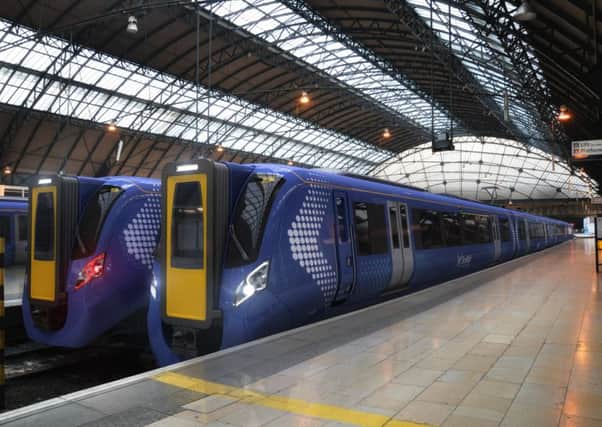Leaders: '˜Bullet train' project must not be allowed to derail


More than three years have whizzed past since the Scottish Government’s bold pledge to deliver a “bullet train” between Edinburgh and Glasgow.
Nicola Sturgeon, the then minister for infrastructure, famously declared that the SNP was not prepared to wait for Westminster to bring high-speed rail to Scotland.
Advertisement
Hide AdAdvertisement
Hide AdCommuters using the nation’s flagship rail route were even told that the much-discussed service could finally be up and running by 2024. The distinct impression was given that it was full steam ahead, with a bold ambition to cut journey times between the two cities to less than 30 minutes.
It is no surprise, then, that the SNP’s political opponents have been doggedly pursuing the issue for the last year amid suspicions that the whole project has been quietly shelved.
Last month transport minister Derek Mackay, who has been left to explain the lack of progress, admitted that the bullet train was reliant on a high-speed rail route coming north from England.
This led to widespread scorn and anger, with the Liberal Democrats accusing the SNP of leaving the project on the sidelines and “hoping nobody would notice”.
Now there is further trouble for ministers after it emerged that have been no meetings to discuss the proposals – which were unveiled by Ms Sturgeon in November 2012 – for more than a year.
At the time, she promised: “The Scottish Government will now enter into talks with our partners in both cities and the rail industry to see how we can work together to see this vision realised – a Glasgow-Edinburgh high speed line which can connect to the network from England.”
Exactly what has happened to these talks is something of a mystery.
Although around £750,000 has so far been spent on these proposals, ministers have refused to release details of the bullet train business case under Freedom of Information laws. Transport Scotland chiefs insist this is because the public may be “misinformed” if unfinished or incomplete information is disclosed.
Advertisement
Hide AdAdvertisement
Hide AdRegardless of whether this dossier may ever be revealed, it is now clear that the Scottish Government’s promised timetable is highly unlikely to be kept.
High-quality transport links are vital to growing Scotland’s economy and providing public transport links even more important because they are the most efficient and greenest way of moving large numbers of people around the country.
The difficulty for the Scottish Government is that they are also very expensive as they can be very complex and require a lot of infrastructure. But they are also vital to tourism and given how many tourists arrive in Edinburgh, it is vital that they can get to other parts of the country quickly and easily.
Scotland must keep pushing to get HS2 but we must also do what is within our powers here to deliver the 21st century transport system Scotland needs.
Viewing Thatcher with hindsight
There is an enduring fascination with the legacy of Margaret Thatcher among long-time followers of Scottish politics. More than a quarter of a century after the “Iron Lady” was toppled from power, the Scottish Conservatives are still hamstrung by the memories of the impact of her policies north of the Border.
The most hated of them all was, of course, the poll tax, and the ill-fated decision to introduce it in Scotland a year ahead of England and Wales. What has not been known until now was how much opposition Mrs Thatcher faced from within her Cabinet. Newly-released papers from the late 1980s have revealed the level of unease over the flagship policy and the repeated warnings that it would lead to political disaster.
Commentators have long regarded the introduction of the poll tax as the key moment when she lost touch with the wider electorate. But now it is clear that there were serious misgivings from ministerial colleagues, including Welsh secretary Peter Walker and environment secretary Nicholas Ridley.
They were warning of an “enormous loophole” in the system which it was feared would lead to more homeless people sleeping on the streets, while Mrs Thatcher was being told of mounting opposition from local authorities.
Advertisement
Hide AdAdvertisement
Hide AdIt is intriguing to look back at the discussions taking place at the heart of the Thatcher Cabinet, in the knowledge that Mrs Thatcher would be effectively removed from power within a year of the poll tax’s introduction.
It is also tempting to wonder her colleagues would have backed its introduction if they had known the party north of the Border would still be struggling under its dark shadow nearly 30 years later.